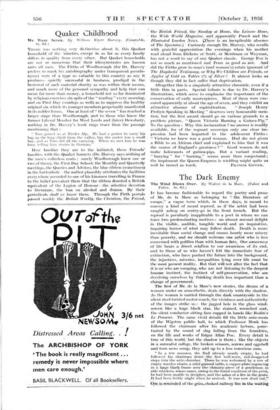Quaker Childhood
TIMM.: was nothing very diitinctive about. it, this Quaker household of the 'nineties, except in so far. as every family differs in quality from every other. But Quaker households are not so numerous that their idiosyncrasies are known unto all men. The Firths of Woolborough (for Dr. Harvey prefers to mask his autobiography under transparent pseudo-
nyms) were of a type as valuable to this country as any it produces,--quietly successful in business, prodigal in the bestowal of such material charity as was within their means, and much more of the personal sympathy and help that can mean far more than money, a household not so far dominated by religious exercises (in spite of the " reading " every morning, and on First Day evenings as well) as to suppress the healthy original sin which its younger members perpetually manifested
in its milder forms. One at least of " the seven " has reached a larger stage than Woolbdrough, and to those who know 'the
former Liberal Member for West Leeds and (later) Dewsbury, nothing in Dr. Harvey's book rings truer than the passage mentioning that :
" Tom joined tii; at Rieder Alp. Ho had a porter to carry his bag up the long climb from the valley, but the porter was a small boy, and so Tom did all the carrying. When we met him he was busy telling him stories in German."
How familiar they are to the initiated, these Friends' families, with the Quake': bonnets (Dr. Harvey says nothing of
the men's collarless coats ; surely Woolborough knew one or two of them), the First Day School, the Monthly and Quarterly
meetings, the Queries and Adviees, the blue ribbon (sometimes) in the buttonhole--the author plausibly attributes the facilities
everywhere accorded to one of his kinsmen travelling in France to the belief prevalent there that the ribbon denoted a British equivalent of the Legion of Honour—the selective aeVotion
to literature, the ban on alcohol and drama. By their periodicals shall ye know them. Through the Firth portals passed weekly the British Weekly, the Christian, the Friend, the' British Friend, the ffunekty at Home, the Leisare ' the Wide World Magazine, and ,apparently Punch and the Illustrated London Neivs. (,There is an inexplicable absence of The Spectator.) Curiously enough Dr. Harvey, who recalls with grateful appreciation the evenings when his mother read aloud from Dickens of Scott, or Merriman. or Weyman, has not a word to say of any Quaker classic. George Fox is not so much as mentioned and Penn as good as not. And did the Firths grow to man's (and woman's) estate ignoraneof The Haydocks' Testimony; or Why We Children are Friends, or Apples of Gold on Tables (?) of Silver ? It almost looks as though they did in fact suffer that deprivation.
Altogether this is a singularly attractive chronicle, even if a little thin in parts. Special tribute is due to Dr. Harvey's illustrations, which serve to emphasise the importance of the conservation of early masterpieCes. Most of them were exe- cuted apparently at about the age of seven, and they exhibit an
attractive absence of sophistication. " Joseph Henry Probyn Speaking in Meeting " deserves very honourable men- tion, but the first award should go on various grounds to a problem picture, " queen ViCtoria Burning a Guinea-Pig." To the question : Why this incineration ? no answer is readily available, for of the regnant sovereign only one clear im- pression had been imparted to the adolescent Firths : " Victoria we knew was a good woman. Had she not given a Bible to an African chief and explained to him that it was the source of England's greatness ? " Good women do not make holocausts of guinea-pigs. But a variant reading, " burying " for " burning," seems more than conjectural ; the implement the Queen-Empress is wielding might quite as










































 Previous page
Previous page